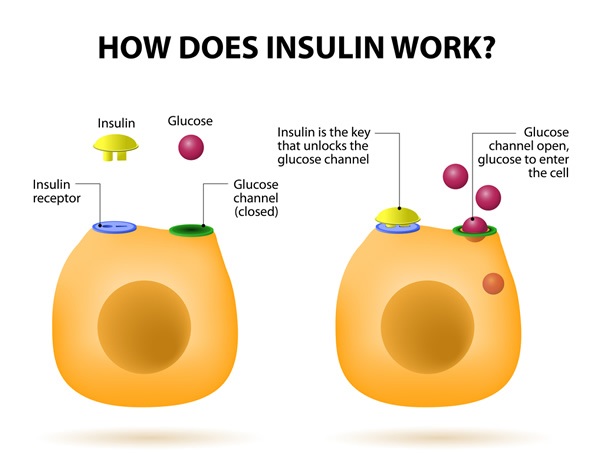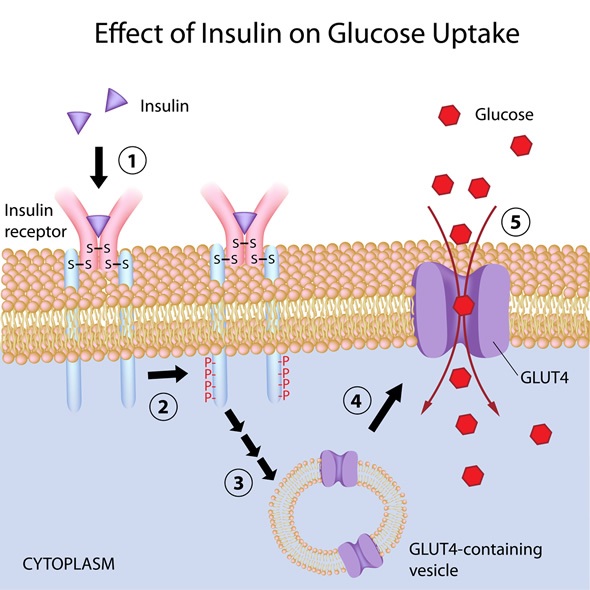Insulin's role in the human body

Insulin is a hormone produced by the pancreas that has a number of important functions in the human body, particularly in the control of blood glucose levels and preventing hyperglycemia. It also has an effect on several other areas of the body, including the synthesis of lipids and regulation of enzymatic activity.

Insulin and Metabolic Processes
The most important role of insulin in the human body is its interaction with glucose to allow the cells of the body to use glucose as energy. The pancreas usually produces more insulin in response to a spike in blood sugar level, for example after eating a meal high in energy. This is because the insulin acts as a “key” to open up the cells in the body and allows the glucose to be used as an energy source.
Additionally, when there is excess glucose in the bloodstream, known as hyperglycemia, insulin encourages the storage of glucose as glycogen in the liver, muscle and fat cells. These stores can then be used at a later date when energy requirements are higher. As a result of this, there is less insulin in the bloodstream, and normal blood glucose levels are restored.
Insulin stimulates the synthesis of glycogen in the liver, but when the liver is saturated with glycogen, an alternative pathway takes over. This involves the uptake of additional glucose into adipose tissue, leading to the synthesis of lipoproteins.

Results Without Insulin
In the absence of insulin, the body is not able to utilize the glucose as energy in the cells. As a result, the glucose remains in the bloodstream and can lead to high blood sugar, known as hyperglycemia. Chronic hyperglycemia is characteristic of diabetes mellitus and, if untreated, is associated with severe complications, such as damage to the nervous system, eyes, kidneys and extremities.
In severe cases, lack of insulin and reduced ability to use glucose as a source of energy can lead to a reliance of fat stores as the sole source of energy. The breakdown of these fats can release ketones into the bloodstream, which can lead to a serious condition called ketoacidosis.
Other Functions of Insulin
In addition to the regulation of glucose, insulin also plays a role in other areas of the body. It may be involved in all of the following functions to:
- Modify the activity of enzymes and the resulting reactions in the body.
- Build muscle following sickness or injury via the transportation of amino acids to the muscle tissue, which is required to repair muscular damage and increase size and strength. It helps to regulate the uptake of amino acids, DNA replication and the synthesis of proteins.
- Manage synthesis of lipids by uptake into fat cells, which are converted to triglycerides.
- Manage breakdown or protein and lipids due to changes in fat cells.
- Uptake of amino acids and potassium into the cells that cannot take place in the absence of insulin.
- Manage excretion of sodium and fluid volume in the urine.
- Enhance learning and memory of the brain functions.
It is evident that insulin plays a number of essential roles in the body, including the management of sugar levels in the blood and many other areas.
References
- http://www.endocrineweb.com/conditions/type-1-diabetes/what-insulin
- http://www.vivo.colostate.edu/hbooks/pathphys/endocrine/pancreas/insulin_phys.html
- http://www.bd.com/us/diabetes/page.aspx?cat=7001&id=7244
- http://www.healthline.com/health/diabetes/insulin-effects-on-body
Further Reading
- All Insulin Content
- What is Insulin?
- Insulin Gene
- Insulin Protein Structure
- Insulin Hypoglycemia
Last Updated: Aug 23, 2018

Written by
Yolanda Smith
Yolanda graduated with a Bachelor of Pharmacy at the University of South Australia and has experience working in both Australia and Italy. She is passionate about how medicine, diet and lifestyle affect our health and enjoys helping people understand this. In her spare time she loves to explore the world and learn about new cultures and languages.
Source: Read Full Article